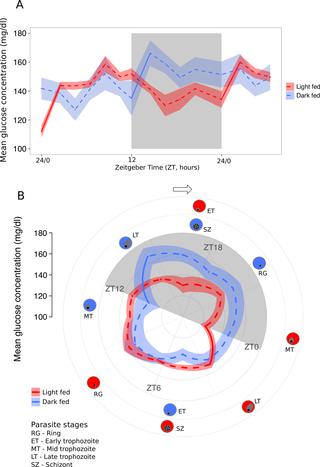PLoS Pathogens ( IF 6.7 ) Pub Date : 2018-02-26 , DOI: 10.1371/journal.ppat.1006900 Kimberley F Prior 1 , Daan R van der Veen 2 , Aidan J O'Donnell 1 , Katherine Cumnock 3 , David Schneider 3 , Arnab Pain 4 , Amit Subudhi 4 , Abhinay Ramaprasad 4 , Samuel S C Rund 5 , Nicholas J Savill 1, 5 , Sarah E Reece 1, 5

|
Circadian rhythms enable organisms to synchronise the processes underpinning survival and reproduction to anticipate daily changes in the external environment. Recent work shows that daily (circadian) rhythms also enable parasites to maximise fitness in the context of ecological interactions with their hosts. Because parasite rhythms matter for their fitness, understanding how they are regulated could lead to innovative ways to reduce the severity and spread of diseases. Here, we examine how host circadian rhythms influence rhythms in the asexual replication of malaria parasites. Asexual replication is responsible for the severity of malaria and fuels transmission of the disease, yet, how parasite rhythms are driven remains a mystery. We perturbed feeding rhythms of hosts by 12 hours (i.e. diurnal feeding in nocturnal mice) to desynchronise the host’s peripheral oscillators from the central, light-entrained oscillator in the brain and their rhythmic outputs. We demonstrate that the rhythms of rodent malaria parasites in day-fed hosts become inverted relative to the rhythms of parasites in night-fed hosts. Our results reveal that the host’s peripheral rhythms (associated with the timing of feeding and metabolism), but not rhythms driven by the central, light-entrained circadian oscillator in the brain, determine the timing (phase) of parasite rhythms. Further investigation reveals that parasite rhythms correlate closely with blood glucose rhythms. In addition, we show that parasite rhythms resynchronise to the altered host feeding rhythms when food availability is shifted, which is not mediated through rhythms in the host immune system. Our observations suggest that parasites actively control their developmental rhythms. Finally, counter to expectation, the severity of disease symptoms expressed by hosts was not affected by desynchronisation of their central and peripheral rhythms. Our study at the intersection of disease ecology and chronobiology opens up a new arena for studying host-parasite-vector coevolution and has broad implications for applied bioscience.
中文翻译:

宿主进食的时间驱动寄生虫复制的节奏
昼夜节律使生物体能够同步支撑生存和繁殖的过程,以预测外部环境的日常变化。最近的研究表明,日常(昼夜节律)节律也使寄生虫能够在与宿主的生态相互作用的背景下最大限度地提高适应性。由于寄生虫节律对其健康至关重要,了解它们的调节方式可能会带来减少疾病严重程度和传播的创新方法。在这里,我们研究宿主昼夜节律如何影响疟原虫无性复制的节律。无性复制导致了疟疾的严重性并加剧了疾病的传播,然而,寄生虫节律是如何驱动的仍然是一个谜。我们扰乱宿主的摄食节律12小时(即夜间小鼠的昼夜摄食),以使宿主的外周振荡器与大脑中的中央光诱导振荡器及其节律输出不同步。我们证明,白天喂养的宿主中啮齿类疟疾寄生虫的节律相对于夜间喂养的宿主中的寄生虫的节律是倒置的。我们的结果表明,决定寄生虫节律的时间(阶段)的是宿主的外周节律(与进食和新陈代谢的时间相关),而不是由大脑中的中央光夹带昼夜节律振荡器驱动的节律。进一步的研究表明,寄生虫节律与血糖节律密切相关。此外,我们发现,当食物供应发生变化时,寄生虫节律会与改变的宿主进食节律重新同步,这不是通过宿主免疫系统的节律介导的。我们的观察表明寄生虫主动控制其发育节奏。最后,与预期相反,宿主表达的疾病症状的严重程度并未受到中枢和外周节律不同步的影响。我们在疾病生态学和时间生物学交叉领域的研究为研究宿主-寄生虫-载体协同进化开辟了一个新领域,并对应用生物科学具有广泛的影响。



























 京公网安备 11010802027423号
京公网安备 11010802027423号